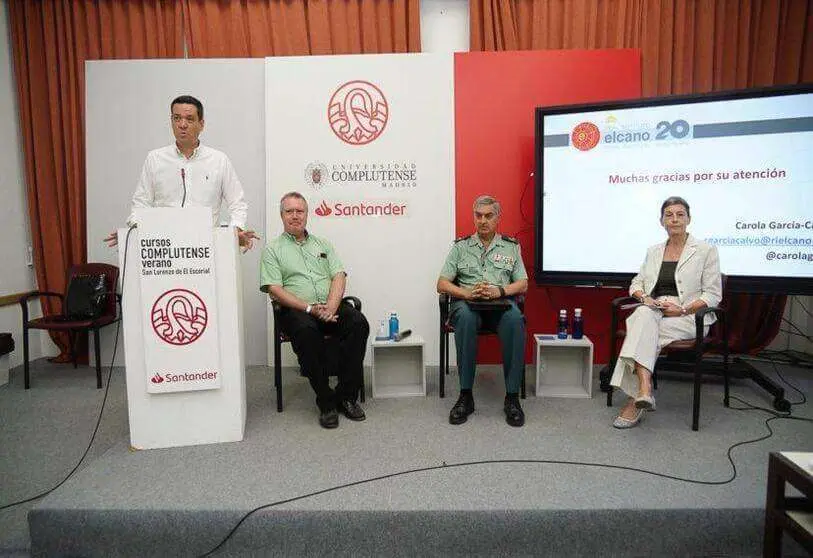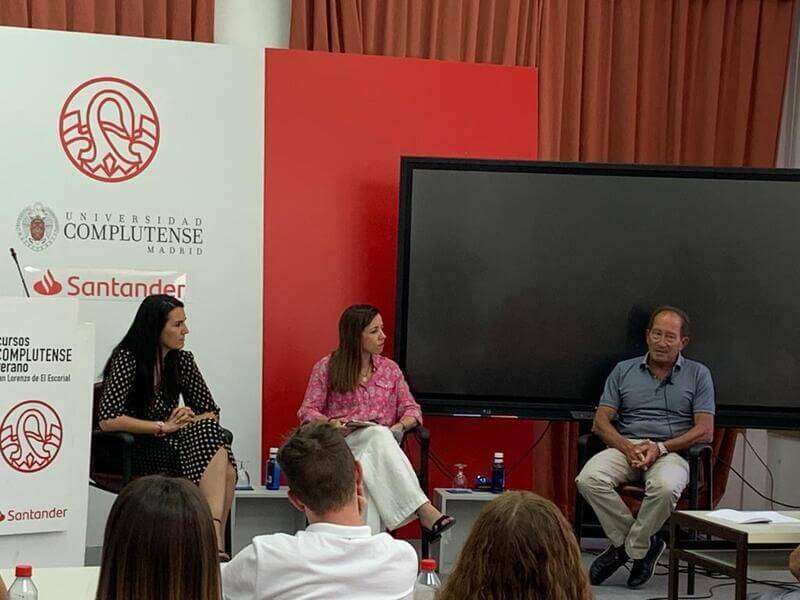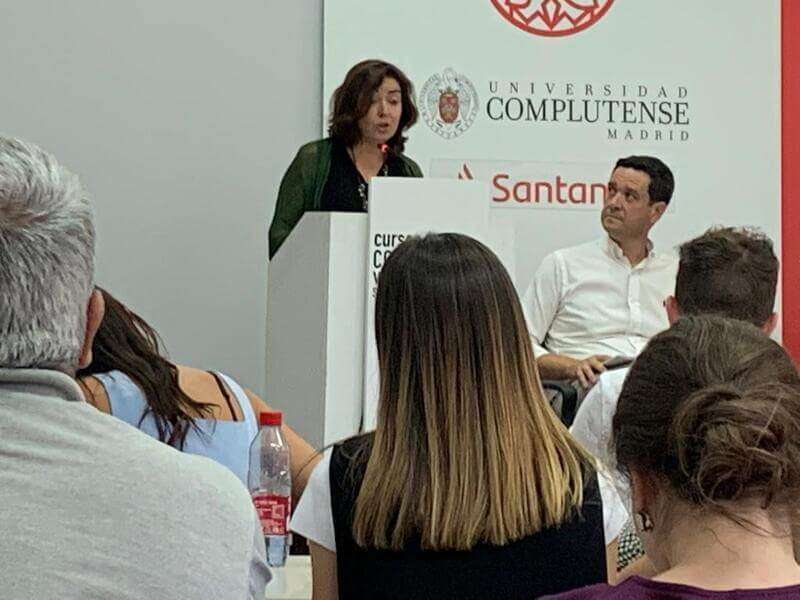The prevention of violent radicalism, geopolitical conditioning factors and the testimony of victims

The course "The Immediate Future of Jihadist Terrorism: Global Trends, Regional Conflicts and Internal Dynamics", held in El Escorial as part of the Complutense University's summer courses, and organised by the Memorial Centre for Victims of Terrorism and the Victims of Terrorism Foundation, began its second day with a talk by Carola García Calvo, principal investigator of the programme on violent radicalisation and global terrorism at the Elcano Royal Institute.
García Calvo presented the European experience in the prevention of violent radicalisation, an aspect that was incorporated into the European Counter-Terrorism Strategy in 2005, after the attacks in Madrid and London alerted us to the homegrown terrorist threat. She identified five main areas of work: ideologies that can lead to violent acts, the issue of Foreign Terrorist Fighters and radicalisation in prisons, the resilience of society at the local level, the internet and priority third countries in the areas of North Africa, the Middle East and the Western Balkans. She also stressed the importance of cross-cutting issues such as gender perspectives and support for victims of terrorism.

This presentation was followed by a round table discussion on the Sahel as an advanced frontier in the fight against terrorism, with high-level panellists. The first speaker was Carlos Echeverría, Deputy Director of the General Gutiérrez Mellado University Institute of the UNED, who emphasised the Jihadist danger in the Western Sahel, an area between Mauritania and Chad where the greatest focus of terrorism is concentrated on the African continent. He underlined the specific difficulties of this scenario, such as the weakness of states often plagued by corruption and the growing influence of actors such as Russia. This latter element could undermine current cooperation with Niger, where most of the European forces mobilised in the area are located, if Russia were to develop propaganda operations similar to those that precipitated the end of Barkhane in Mali, said Echevarría.
Francisco Espadas, Major General of the Guardia Civil and Director of the Rapid Action, Surveillance and Intervention Groups (GARSI Sahel), then explained the objectives of this project in which Spain, France, Italy and Portugal are collaborating to train and provide material to the gendarmeries of Mali, Mauritania, Burkina Faso, Niger, Chad and Senegal. This cooperation aims to create perennial units capable of acting in peacebuilding environments and strengthening territorial control. Francisco Espadas addressed the obstacles facing the project, especially in Mali, where it has been suspended due to the risk that part of the European equipment will end up in Russian hands, and in Burkina Faso, which after the coup d'état of January 2022 has been plunged into uncertainty.
The final speaker on this panel was Natividad Fernández Sola, Professor of International Public Law and International Relations at the University of Zaragoza, who analysed the weaknesses of the Mediterranean Dialogue, an initiative promoted by Spain to foster understanding with NATO's southern neighbouring states. She highlighted the absence of Libya and the Sahel countries, despite the fact that they are a source of destabilisation for the African continent. She also mentioned NATO's perception of two blocs, north and south, a division that ignores the tensions between Algeria and Morocco, as well as the lack of attention given to the Israeli-Palestinian conflict, the mistrust of local populations and internal tensions within NATO caused by actors who would consider the area to be their exclusive zone of influence.

Florentino Portero, Director of the Institute of International Politics at the Francisco de Vitoria University, also spoke, explaining the difficulty of arriving at a consensus definition of terrorism that would allow the concept to be satisfactorily transferred to the sphere of international law. He reviewed the states that have stood in the way of a clear definition in order to continue instrumentalising terrorism for their own interests. This trend could be increasing as a result of the decline of the liberal order, which framed competition between powers with international norms and bodies. Florentino Portero foresees conflicts becoming increasingly hybrid and asymmetric, and therefore likely to involve terrorist groups and organisations.
The final day of the course featured the testimony of victims' relatives. María Jiménez, journalist and professor of Communication at the University of Navarra, engaged in a conversation with Juan Carlos Fernández, brother of the Spanish missionary Antonio César Fernández who was murdered in Burkina Faso three years ago, who emphasised that he always did good and left the world better than he found it. His vocation as a missionary translated into many years of social commitment in Africa, where he implemented the ideology of the Salesian schools. At the age of 71, and against his family's wishes, he accepted what would be his last mission: Burkina Faso. On 15 February 2019, near the southern border of the country, a group of jihadists searched his car before taking César to a nearby forest where they shot him three times. His brother evoked the administrative battle he had to go through to bring his remains and the coldness of the circumstances in which they were finally returned to the family, in a commercial hangar where goods are usually transported. He concluded his testimony by affirming the importance of the presence of missionaries like César in Africa, where they take on another aspect of the fight against terror, promoting education and equality.
Cristina González, sister of Alberto, who died in the attack on the Bataclan on 13 November 2015, also took part. Cristina described Alberto as a happy person, who also made others happy. She recalled the endless search for her brother in all the Parisian hospitals, not knowing if she would find him alive, until she was given the terrible news of his death. She criticised the lack of translation facilities to assist her family in the procedures following the attack, as well as the lack of psychological and financial support during the ten days she stayed with her family in Paris before being able to return to Spain with Alberto's body. Regarding the trial of the November attacks, which began in September last year and ended a week ago, she described it as a pantomime. She said it was of little use to her to clarify the circumstances of her brother's last moments, as these should not overshadow the 29 years he lived happily. She added that the trial did not achieve either of the two objectives it was supposed to have fulfilled: to judge the guilty, but also to establish responsibility. She expressed her disappointment at the sentences handed down to those who assisted the terrorists and highlighted a number of errors at the police level, regretting that these were not addressed during the trial. She also highlighted the responsibility of the French state by denouncing the serious lack of reflection on the conditions of radicalisation of those who would become her brother's executioners.

These testimonies were followed by a long and emotionally charged round of applause before Isabel Goicoechea, under-secretary of the Ministry of the Interior, closed the course.








